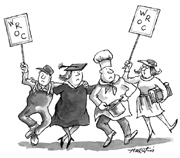|
Web
Exclusives: Raising Kate
By Kate Swearengen '04 My friend Peter had been agonizing for two weeks over the evaluation he had filled out for his Spanish class. "I feel so bad," he moaned, explaining that he had written unflattering comments about his professor's teaching abilities. "I said horrible things. I even e-mailed the director of studies to see if I could retract my comments. He laughed at me." I laughed, too. Prior to winter break we had been given two evaluations to fill out for each of our classes. One consisted of a multiple-choice form regarding the quality of homework assignments, instruction, readings, and tests. The other was an essay form upon which students were invited to make further comments. Assuming that the multiple-choice form would be electronically scanned, and that the essay forms would be relegated to some dark corner of the registrar's office, I didn't spend a lot of time on the evaluations. The sight of Peter dejectedly picking apart a greasy Italian pastry amused me; we were at Frist, after all, surrounded by pajama-clad students who were sleeping and studying there so as not to waste time commuting across campus. This was the time to worry about finals and term papers, not class evaluations. "You don't understand," he said miserably, leaning across the table. "I wrote that she wasn't qualified to teach at Princeton." He put his hands over his eyes. "Don't worry, Peter," I said, needling him a little. "She'll be able to get a job somewhere. I just hope she's not a single mother who won't be able to feed her children because some overprivileged kid was upset about getting an A-minus in the class." "That wasn't it at all," he insisted. "She really was a horrible professor. She couldn't explain anything." "Then you were right to give her a poor evaluation," I said. "With what we pay for tuition, we should have good instructors." "But she was so nice," Peter said. "I'm sure she was trying hard, and now she's going to read my evaluation and feel terrible." "You're kidding," I exclaimed. "Our professors get to read the evaluations? I wish someone had told me that before I wrote all those scathing things about the volcano lab in geology. I even think I wrote my name on the survey out of some perverse sense of outrage. And really, when you think about it, injecting Jello volcanoes with red food coloring isn't so bad." I told Zach and Alicia about the conversation later. "Oh my God," said Alicia. "You're complaining because you wrote bad things about a couple of labs? I wrote that my professor needed a pacemaker." "At least they don't read the evaluations until after we've been given our grades," I said. "Do preceptors get to read the comments, too?" asked Zach. "Because I wrote that my chemistry preceptor was an arrogant jerk who didn't know half as much about science as he thought he did. Not only do I have very distinctive handwriting, I also have the same preceptor for second semester. I guess he won't be cutting me any slack on problem sets." Ah, the pitfalls of performance reviews. Administered just prior to the stressful exam period, and handed out in the final minutes of class, the evaluations were hastily completed by some students and used as instruments of vengeance by others. It's safe to say that most professors won't be damaged by the negative comments contained therein; such evaluations are subjective, after all, and the motivations of the respondents are undoubtedly taken into account. Academia is a pretty safe place for those at the top of the hierarchy, for whom an unfavorable evaluation is little more than a bruise to the ego. While faculty members are unlikely to suffer from these reviews, the situation is different for other university employees. "Workers' wages are now based on highly subjective performance reviews," reads the website of the newly formed Workers' Rights Organizing Committee, a group seeking to improve the lot of Princeton's kitchen staff, library workers, and janitors. ""So there is no guarantee that a worker's wages will keep pace with market rates, let alone cost of living. Princeton's system is also designed in such a way that if more workers score well on the reviews, each worker will get a lower raise than if just a few had scored well." Add to this problem the chronically low wages and inadequate health benefits received by maintenance, kitchen, and library workers; in 1999, janitors were paid $11.19 an hour, an amount which did not keep pace with the cost of living. Considering that the university's endowment is at an all-time high of $8 billion, this situation is particularly appalling. Even more surprising
is the fact that only 15 professors have taken a proactive stance
on the issue by affiliating themselves with the Workers' Rights
Organizing Committee. This is a school, after all, that likes to
speak of itself as a progressive institution. It is disquieting
that so few faculty members have allied themselves with the people
that clean their classrooms and deliver their mail. Which raises
the question: would things be different if faculty members were
judged by the same standards as Princeton's library staff, kitchen
workers, and janitors? What if faculty salaries were determined
by performance reviews, and if the evaluation forms hastily completed
by jaded undergraduates dictated their professors' livelihoods?
|

 February
7 , 2001:
February
7 , 2001: